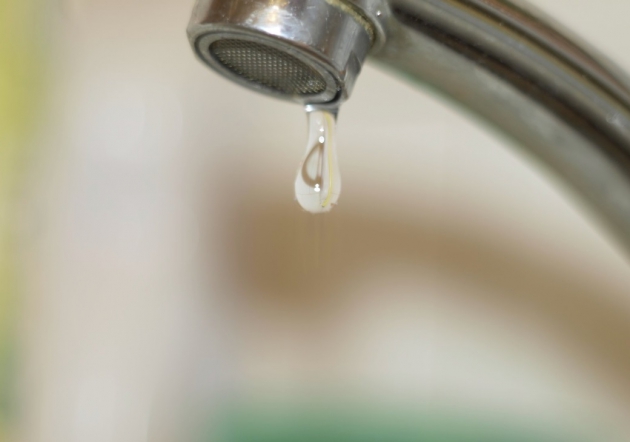Keeping a home looking clean and fresh can be a real challenge, but it can be even more frustrating when you have hard water. Whether you have white residue on your fixtures, stains in your toilet, streaks on your mirrors or soap scum, hard water can cause a number of issues around your home that are a major headache. Fortunately, there are some ways to eliminate those stains and spots for good.
The Causes of Hard Water Stains and Spots:
Hard water is essentially water with elevated levels of calcium and magnesium. Water is an effective solvent and it dissolves and absorbs minerals as it travels through rocks to aquifers and other water sources. Unfortunately, when water evaporates on the surfaces inside your home, these minerals are left behind.
While it is easy to assume that only homes with a private well have hard water issues, hard water is actually a fairly widespread issue. In fact, approximately 85 percent of households in North America have hard water. Since municipal water treatment facilities do not treat water hardness, many people supplied with city water can experience hard water issues.
The Extent of the Problem:
Although it is easy to assume that hard water stains and spots are only an aesthetic issue, they can have further reaching consequences. Hard water minerals can not only clog shower heads or taps, but it can also create soap scum. This occurs when the hard water minerals combine with soap to create a thick, sticky residue.
Unfortunately, if soap scum lingers, it can lead to mildew and mold growth. Additionally, if you have soap scum on your vinyl shower curtain, it can create a microbial film that provides ideal conditions for bacteria.
How to Clean Hard Water Stains and Spots:
There are a number of cleaning products that have been formulated to address hard water spots and soap scum. Essentially, these products soften the water as you clean, but they can contain harsh chemicals. Fortunately, there are some DIY techniques which allow you to attack soap scum with household products that you may already have in your cleaning cupboard.
Create a White Vinegar Spray:
White vinegar is extremely effective at removing hard water stains and spots. Mix a solution of half and half white vinegar and water into a spray bottle. This can be sprayed inside your shower and around your bathroom or kitchen. Allow the solution to sit for a couple of minutes before you wipe down with a clean, damp cloth.
You can also soak some paper towels with this solution to wrap around stained fixtures. You’ll need to allow the towels to sit for approximately an hour before you rinse with water.
Tackle Hard Water Stains in the Toilet:
Hard water spots can be extremely unsightly inside toilets, but you can tackle them with a mixture of baking soda and vinegar or borax and vinegar. These combinations create a fizzy chemical reaction which can loosen the stains. You can then clean them with a toilet brush.
Create a Baking Soda Paste:
If you have particularly stubborn spots and stains, such as on ceramic tile or grout, you should create a baking soda paste with white vinegar. You’ll need to gauge the amount of vinegar needed to form a thick paste which can be spread on the problem areas. After approximately 15 minutes, you can scrub away the paste and rinse the surface.
Soak Your Shower heads:
Shower heads can be particularly vulnerable to becoming clogged with scale, reducing the water pressure. To resolve this, you should remove the shower head and allow it to soak in a container full of white vinegar for several hours. If it is not possible to remove the showerhead, you can put white vinegar into a plastic bag and secure it around the showerhead using a rubber band.
Use Lemon Juice:
All the previous tips we’ve mentioned have focused on white vinegar, but if you don’t have any to hand or don’t like the smell, you can use lemon juice. Lemon juice can be sprayed on fixtures to remove hard water stains in a similar way to using white vinegar.
Address the Underlying Cause:
While the tips we’ve covered above can be highly effective at removing hard water stains and spots, if you want to permanently eliminate these issues, it is important to address the underlying cause.
You will continue to have hard water stains and spots, along with other hidden issues. Just as hard water minerals can impact your home aesthetically, they can also accumulate inside your plumbing pipes and water using appliances. Over time, this can lead to reduced water pressure and the need for premature replacement of your appliances, since the appliances are forced to work harder and longer to compensate for the scale accumulation.
Fortunately, there are a number of options to eliminate these problems from your home. Water softeners are designed to remove the hard water minerals through the process of ion exchange. This type of solution can be installed as a point of use or point of entry system. This can provide softened water at just one location, such as the kitchen sink or throughout your home.
With softened water, you will need less detergent, since the cleaning and lathering performance is not hindered by the hard water minerals. You will also notice that there are little or no spots and stains around fixtures and surfaces exposed to water. This means that you will be able to enjoy a soap scum and hard water spot free home.
If you are struggling with hard water stains and spots or have concerns about the quality of your water, be sure to speak to a water treatment specialist. An experienced technician will not only be able to assess your water quality and determine the level of water hardness, but also guide you through the various treatment solutions that are appropriate for your water supply and home.

